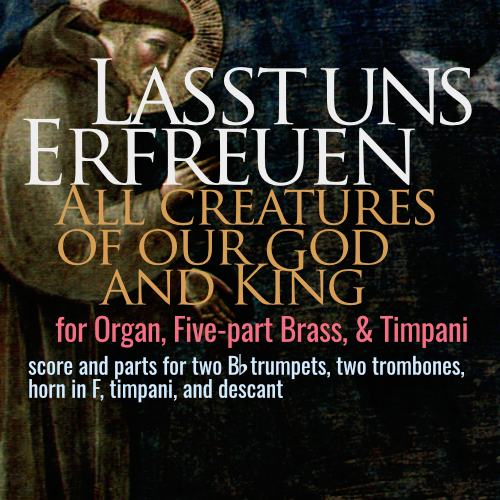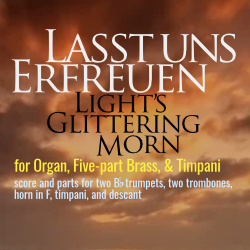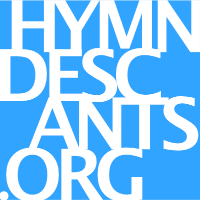
Audioplayer
All creatures of our God and King
Seven verse arrangement of All Creatures of our God and King, an adaptation of Canticle of the Sun by St. Francis of Assissi (1225). Very few hymnals use the same text used in any other hymnal, yet these dialectic differences has done little to dampen the affection worshippers feel for St. Francis' hymn and sensibility. The tune was the setting for the Easter hymn, Lasst uns erfreuen herzlich sehr, an anonymous tune which first appeared in the Jesuit hymnal Ausserlesene Catholische Geistliche Kirchengesänge (Cologne, 1623, ed. Friedrich Spee, which quotes antecedents).
This audio demo is based on the Easter version, five verses, descant on verse 2. The All Creatures of our God and King arrangement inserts two additional hymnal verses not included in this audio before the descant, which becomes verse 4.
This version only

About
Born the son of a wealthy merchant, Giovanni di Pietro di Bernardone was given the name Francesco (Frenchman) by his father following a trip to France. After a comfortable youth, he joined one of the innumerable wars between Italian city-states, eventually enduring injury, capture, and imprisonment. Following his release, he began to grow disillusioned with the life of material wealth - and in his early 20’s, joined a pilgrimage to Rome where he associated with the poor, begging at the doors of St. Peter’s. Upon return, he withdrew to the countryside, and now within proximity to the decrepit church of San Damiano, he began to rebuild it himself, stone by stone, the material needs for the project acquired through begging. Within two years, Francesco d’Assissi mission grew to 11 friars (brothers; none were fathers, ie, priests) and in 1209 traveled to Rome with their simple rule, seeking the Pope’s authority to found a mendicant order.
Canticle of the Sun was written in Francis’ native Umbrian dialect - not Latin - based on Psalm 148, the third verse of which is “Praise ye him, sun and moon: praise him, all ye stars of light” (KJV). Francis hymn is a lauda, a song of praise written in the vernacular for use outside the church, and includes verses translated “Be praised, my Lord, through all your creatures, especially through my lord Brother Sun” and “Praised be You, my Lord, through Sister Moon and the stars.” It would be nearly 700 years before William Draper paraphrased the hymn in English verse, originally for use with children.
This tune was the setting for the Easter hymn, Lasst uns erfreuen herzlich sehr, which celebrates the resurrection narrative from the perspective of Mary. It first appeared in the Jesuit hymnal Ausserlesene Catholische Geistliche Kirchengesänge (Cologne, 1623, ed. Friedrich Spee), and the setting quickly produced variants regarding the distribution of the alleluias. German literature usually attributes authorship of both the text and the tune to the collection's editor. As a poet and hymnologist, the attribution to him of the text is plausible; however there are no first-hand references to support an assertion of musical composition. Moreover, the opening phrase can be found in a tune 100 years earlier attributed to Matthäus Greiter and adapted to GENEVAN 36 and 68, published in 1525. Authoritative English language sources are devoid of the attribution. Originally rendered in common time, Ralph Vaughan Williams' harmonization rendered the music in the now more familiar 6/4 for the 1906 English Hymnal.
References
Canticle of the Sun, Wikipedia (retr. 2021)
Christianity Today: Francis of Assisi: Mystical founder of the Franciscans
Editions
Version 9.2.2
- Shorter prologue (P2)
- Minor voice leading revisions
- Improved parts layout
- Vocal part prints duplex 11x1
----Previous Versions ----
Version 9.1.1
- Revised cadence to lower penultimate note in descant
- Voice leading revisions brass instruments
- Correction in descant to remove a parallel
- Adds All Creatures of our God and King
8.10.2
- Revised and shortened the Prologue
- Other minor revisions to organ, brass parts
- Simplified parts sets
8.7.6
- Initial publication
Verses
1 All creatures of our God and King,lift up your voices, let us sing:
alleluia, alleluia!
Bright burning sun with golden beams,
Pale silver moon that gently gleams,
O praise him, O praise him,
Alleluia, alleluia, alleluia!
2 Great rushing winds and breezes soft,
you clouds that ride the heavens aloft,
O praise him, Alleluia!
Fair rising morn, with praise rejoice,
stars nightly shining, find a voice:
O praise him, O praise him,
Alleluia, alleluia, alleluia!
3 Swift flowing water, pure and clear,
make music for your Lord to hear,
Alleluia, alleluia!
Fire, so intense and fiercely bright,
you give to us both warmth and light,
O praise him, O praise him,
Alleluia, alleluia, alleluia!
4 Dear mother earth, you day by day
unfold your blessings on our way;
O praise him, Alleluia!
All flowers and fruits that in you grow,
let them his glory also show:
O praise him, O praise him,
Alleluia, alleluia, alleluia!
5 All you with mercy in your heart,
forgiving others, take your part,
O sing now: Alleluia!
All you that pain and sorrow bear,
praise God, and cast on him your care:
O praise him, O praise him,
Alleluia, alleluia, alleluia!
6 And even you, most gentle death,
waiting to hush our final breath,
O praise him, Alleluia!
You lead back home the child of God,
for Christ our Lord that way has trod:
O praise him, O praise him,
Alleluia, alleluia, alleluia!
7 Let all things their creator bless,
and worship him in humbleness,
O praise him, Alleluia!
Praise God the Father, praise the Son,
and praise the Spirit, Three in One:
O praise him, O praise him,
Alleluia, alleluia, alleluia!
Easter Version
Light's glittering morn
Five-verse arrangement of the hymn Light's glittering morn, translated by John Mason Neale from the 9th C. office hymn, Aurora lucis rutilat ("Dawn's light glitters") as found in the 2013 edition of Hymns Ancient and Modern.
The hymn Light's glittering morn is translated from the 9th C. office hymn, Aurora lucis rutilat ("Dawn's light glitters") found in the Frankish Murbacher Hymnen. Because it is written in an Ambrosian meter, it is thought by some scholars to have antecedents though no earlier sources are known. The texts are in Latin with translations in Old High German formatted as interlinear glosses. The original eleven verses plus doxology have since been separated in the Roman Breviary into three separate hymns for use at Lauds, which is sung at daybreak; the current version is from John Mason Neale's translation, as found in the 2013 edition of Hymns Ancient and Modern, which compresses the original versification into a single, five-verse hymn.

